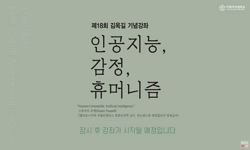본 연구는 인공지능(Artificial Intelligence) 설계 기반 UX 디자인과 인간 협업 설계 기반 UX 디자인이 사용자 경험(User eXperience)과 App 디자인의 신뢰도에 미치는 영향을 분석하였으며, 자기 해석(Self...
http://chineseinput.net/에서 pinyin(병음)방식으로 중국어를 변환할 수 있습니다.
변환된 중국어를 복사하여 사용하시면 됩니다.
- 中文 을 입력하시려면 zhongwen을 입력하시고 space를누르시면됩니다.
- 北京 을 입력하시려면 beijing을 입력하시고 space를 누르시면 됩니다.

인공지능 설계 기반 UX 디자인의 사용자 경험 영향 분석: 자기 해석 성향의 조절 효과 = Analysis of the Impact of AI-Based UX Design on User Experience: Focusing on the Moderating Role of Self-Construal
한글로보기https://www.riss.kr/link?id=A109321881
-
저자
신창엽 (경동대학교 디자인학과)
- 발행기관
- 학술지명
- 권호사항
-
발행연도
2024
-
작성언어
Korean
-
주제어
인공지능 ; 자기해석 ; 기술수용 ; 사용자 경험 ; Artificial Intelligence ; Self-Construal ; Technology Acceptance Model ; UX
-
등재정보
KCI등재
-
자료형태
학술저널
-
수록면
313-324(12쪽)
- 제공처
-
0
상세조회 -
0
다운로드
부가정보
국문 초록 (Abstract)
본 연구는 인공지능(Artificial Intelligence) 설계 기반 UX 디자인과 인간 협업 설계 기반 UX 디자인이 사용자 경험(User eXperience)과 App 디자인의 신뢰도에 미치는 영향을 분석하였으며, 자기 해석(Self-Construal) 성향(독립적 vs. 상호의존적)의 조절 효과를 탐구 하였다. 연구 결과, 독립적 성향의 사용자는 인공지능 설계 기반 UX 디자인을 선호하는 경향이 있으며, 이는 독립적 성향의 사용자가 자율성, 효율성, 혁신을 중시하기 때문이다. 인공지능의 자동화 및 개인화 기능은 독립적 성향의 사용자가 자기 계발과 목표 달성을 극대화할 수 있는 수단으로 인식 되기 때문이다. 반면, 상호의존적 성향의 사용자는 인간 협업 설계 UX 디자인에 더 큰 신뢰를 보였으며, 이는 상호의존적 성향의 사용자가 타인과의 상호작용과 협업의 가치를 중시하기 때문이다. 인간 중심의 설계 UX 디자인은 상호의존적 성향의 사용자에게 사회적 유대와 관계 형성을 강화하는 경험을 제공하며, 더 높은 만족도를 유발한다. 본 연구는 사용자 성향(독립적 성향 vs. 상호의존적 성향)에 따른 맞춤형 UX 디자인 전략 개발에 중요한 시사점을 제공하며, 인공지능과 인간 중심 설계의 조화로운 활용을 통해 다양한 사용자 요구를 충족할 수 있는 방향성을 제시한다.
다국어 초록 (Multilingual Abstract)
This study analyzes the impact of AI-based UX design and human-collaborative UX design on user experience (UX) and app design trust, focusing on the moderating role of self-construal (independent vs. interdependent). The findings indicate that users w...
This study analyzes the impact of AI-based UX design and human-collaborative UX design on user experience (UX) and app design trust, focusing on the moderating role of self-construal (independent vs. interdependent). The findings indicate that users with an independent self-construal tend to prefer AI-based UX design, as they value autonomy, efficiency, and innovation. The automation and personalization features of AI are perceived by these users as tools for enhancing self-improvement and achieving their goals. In contrast, users with an interdependent self-construal exhibit greater trust in human-collaborative UX design, as they prioritize interaction and cooperation. Human-centered UX design provides interdependent users with experiences that reinforce social bonds and relationships, resulting in higher satisfaction. This study offers valuable insights for developing customized UX design strategies tailored to user dispositions (independent vs. interdependent) and suggests how the harmonious integration of AI and human-centered design can effectively meet diverse user needs.
동일학술지(권/호) 다른 논문
-
- (사)한국커뮤니케이션디자인협회 커뮤니케이션디자인학회
- 박광신
- 2024
- KCI등재
-
- (사)한국커뮤니케이션디자인협회 커뮤니케이션디자인학회
- 서송이
- 2024
- KCI등재
-
상호작용 의례 사슬의 관점에서 본 가상 아이돌 팬 커뮤니티의 상호작용 분석 -'뤄톈이'(洛天依:Luo Tianyi) 팬 커뮤니티를 중심으로-
- (사)한국커뮤니케이션디자인협회 커뮤니케이션디자인학회
- 두운
- 2024
- KCI등재
-
- (사)한국커뮤니케이션디자인협회 커뮤니케이션디자인학회
- 김수빈
- 2024
- KCI등재
분석정보
연관 공개강의(KOCW)
-

[제18회 김옥길기념강좌] 인공지능, 감정, 휴머니즘(Human-Compatible Artificial Intelligence’)’
이화여자대학교 스튜어드 러셀 -

누구나 할 수 있는 데이터 분석과 인공지능[Data Analysis and Artificial Intelligence for Everyone]
K-MOOC 인하공업전문대학 이세훈 -

누구나 할 수 있는 데이터 분석과 인공지능[Data Analysis and Artificial Intelligence for Everyone]
K-MOOC 인하공업전문대학 이세훈 -

인공지능 플랫폼 서비스 구축 및 실습
원광대학교 조규정 -

인공지능
충북대학교 이건명




 KISS
KISS

